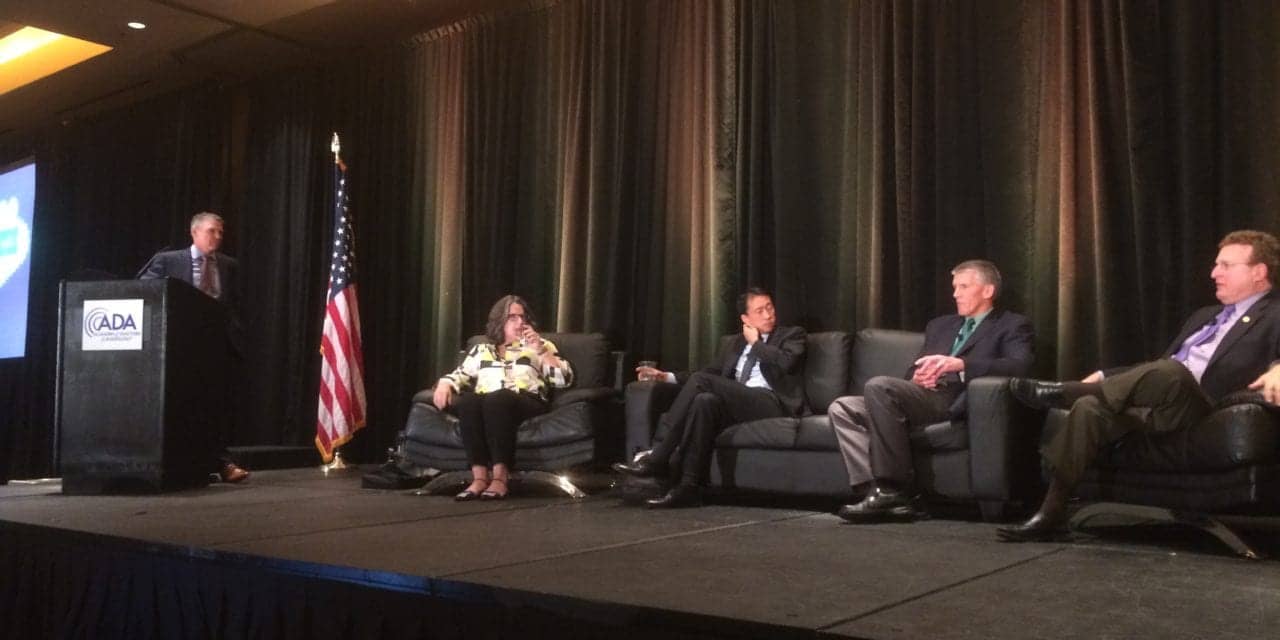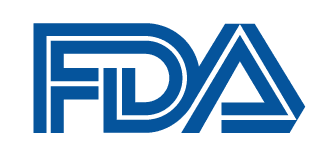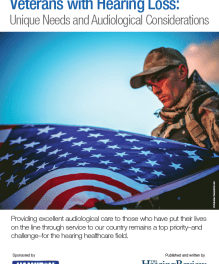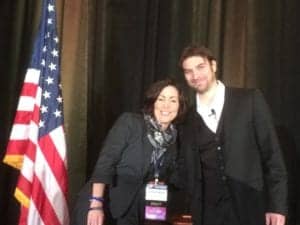
[Click on images to enlarge.] ADA Executive Director Stephanie Czuhajewski was recognized for her tireless efforts on behalf of the organization by ADA President Brian Urban.
On the opening day of the 4-day convention, several workshops were offered. A workshop on “Interventional Audiology”—a 2-part session that looked at building bridges between the audiology and the physician communities, as well as how audiologists are being mired in their efforts to become limited-license providers by being too dependent on product sales—was offered by Brian Taylor, AuD, Bob Tysoe, Barry Freeman, PhD, Amyn Amlani, PhD, and Ian Windmill, PhD (Part 1 and Part 2 of a related series have been published in The Hearing Review). Likewise, several practice-building seminars titled “Taking Care of Business” were conducted by Sam Rotella, Kevin St Clergy, MS, Steve Woodward, and Brandan Ford. Additionally, a panel discussion on the evaluation and management of vestibular disorders was moderated by Sam Bittel, AuD.
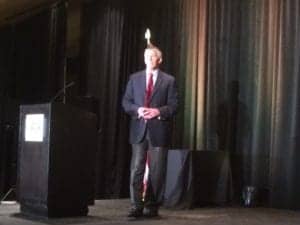
Larry Humes presented a “Game Changer” session titled, “Understanding the Speech-Understanding Problems of Older Adults.”
Among the many things that stood out at the convention were the “game changer” sessions and keynotes that included topics about the future of pharmaceuticals in hearing healthcare (Kathleen Campbell, PhD); peripheral, cognitive, and central auditory aspects of hearing loss in adults (Larry Humes, PhD); the relationship between aging and hearing loss and alternate models of care (Frank Lin, MD, PhD), as well as a follow-up panel discussion focusing on many of these same topics (with Barbara Weinstein, PhD, David Citron, PhD, Drs Lin and Humes, and moderated by Dan Quall, AuD). The educational program also offered 20 seminars that ranged in subjects from the new challenges faced by dispensing practices to tinnitus management. Additionally, The Hearing Review hosted a 1-hour presentation, “10 Winning Tips for Patient Loyalty,” brought to attendees by CareCredit, which featured long-time industry marketing expert Sergei Kochkin, PhD, and Michele Ahlman of Clear Digital Media and Alex Aubert of Solutionreach.
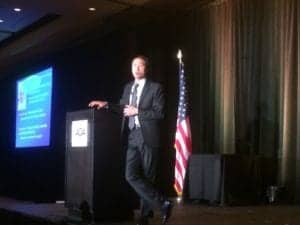
Dr Frank Lin shares his research on age-related hearing loss and cognition during his “Game Changer” session, “Hearing Loss and Aging: Consequences, Implications, and Creating Better Outcomes Through Alternate Models of Care.”
ADA initiatives and honors. At the General Session and President’s Address, ADA President Brian Urban, AuD, mixed his humorous and personal perspectives with important information about the Academy’s activities during 2014. In particular, he acknowledged the skepticism relative to the Academy’s ambitious 18×18 initiative launched at last year’s convention, which has the goal of amending Title XVIII of the Social Security Act by 2018 to give audiologists limited-license physician status in the provision of audiology services under Medicare. Representatives Lynn Jenkins (R-KS) and Matt Cartwright (D-PA) introduced the legislation in Congress on July 31.
Dr Urban says that ADA has always been an organization that has taken the lead in envisioning where the profession should be moving, such as in the establishment of the AuD as the preferred designator for clinical audiologists. “I look around this room and I see people who have fought and sacrificed to make my life and my profession better and stronger,” said Urban. “They are the ones who have directly affected the way in which audiology is practiced today. As the great American philosopher Eric Hoffer put it, ‘In times of change learners inherit the earth, while the learned find themselves beautifully equipped to deal with a world that no longer exists’ —and I can tell you that ADA is full of learners.
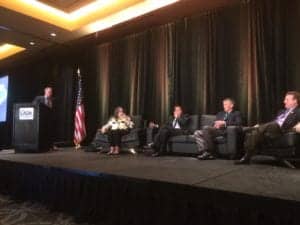
In a panel discussion moderated by Dan Quall, the need for greater awareness about the influence of hearing loss and what needs to be done to create more public awareness of its implications was discussed by Barbara Weinstein, Frank Lin, Larry Humes, and David Citron.
“Two years ago, many of us decided to vote for the 18×18 launch,” continued Urban. “ADA is a member-driven organization that has always led the way, so if you are a student or [a new ADA member], I strongly encourage you to spend time talking with some of the learners around you about our organization and about our profession. I guarantee that you’ll walk away with a whole new perspective on what it means to be an audiologist. But it can’t end there…It has to continue at home. That’s where the hard work occurs. It happens when we’re talking to classmates and it happens when we’re talking with colleagues in classrooms and practices; it happens at your state conventions. That’s where we truly see the progress…ADA as an organization can only do so much. It’s up to the membership that has to move this forward.”
Urban says the fruits of that labor are already evident in the endorsements of several organizations, including several state audiology organizations, the Scott Haug Foundation, Salus University, and the David & Carol Myers Foundation. Notably, it was announced just prior to the convention that the American Academy of Audiology (AAA) has endorsed 18×18.
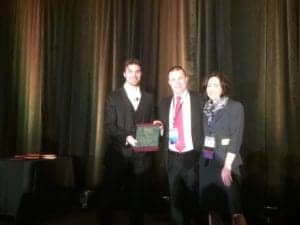
Gregory Frazer, PhD, AuD, received the Academy’s Leo Doerfler Award for excellence in clinical practice.
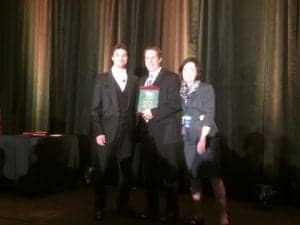
Tim Steele, PhD, received the ADA Advocacy Award for his instrumental work in introducing the Audiology Patient Choice Act of 2014.
Urban also recognized several luminaries in ADA and audiology at the general assembly. These included:
- Special recognition to ADA Executive Director Stephanie Czuhajewski, CAE, who works tirelessly on behalf of the organization.
- The Leo Doerfler Award, which honors excellence in clinical practice, was presented to Gregory Frazer, PhD, AuD, of Pacific Specialists Hearing and Balance Center in Los Angeles.
- The ADA Advocacy Award was presented to Tim Steele, PhD, of Associated Audiologists in Overland Park, Kan, for his instrumental work in helping introduce the Audiology Patient Choice Act of 2014.
- The David P. Goldstein Outstanding Audiologist Award was presented in memory of the late George Osborne, PhD, the first dean of PCO School of Audiology (Salus University), and was accepted by Victor Bray, PhD.
- The ADA Student Advocacy Award went to Rachel Magann Faivre of Northern Illinois University.
The convention also had its share of special social and learning events. This convention has always been known as an ideal place to network with like-minded dispensing professionals, and there were ample opportunities to do so at the Opening Night Reception in the exhibit hall, as well as at Friday night’s “Cherry on the Top Party” by the pool. Additionally, a Live Business Plan Competition was held on Saturday morning.
Next year. The 2015 Annual Convention will be held on November 12-15, 2015 at the Hyatt Regency Capitol Hill in Washington, DC. For more information, visit www.audiologist.org.

